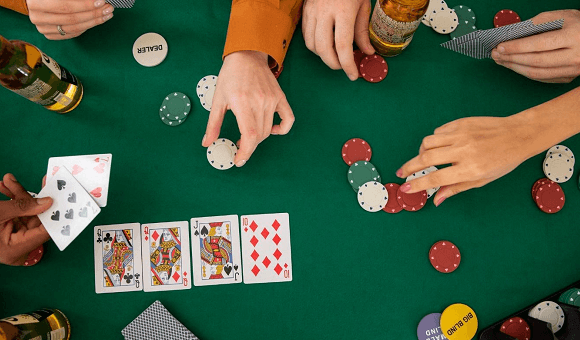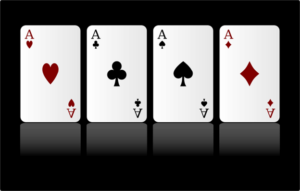Poker Terms – Comprehensive Guide for Beginners

So, you’re planning to take up poker as a pastime? If you’re new to poker, it’s vital that you familiarise yourself with key poker terms before you get started.
It doesn’t matter whether you’re taking it seriously or playing for fun, you’ll be playing poker to win, right? Our poker glossary covers all the most used poker terms to help Aussies master the rules and dynamics of this classic card game.
If you sit down with experienced players and you’re unfamiliar with poker terminology, it’s highly likely that you’ll make basic errors at the table.
Even if it’s just sitting and listening to your fellow players talk about the action and better understanding their thought processes, by nailing the main poker definitions you’ll be sitting in the front seat – forewarned is forearmed!
Useful Poker Terms
Below, we’ve put together our extensive list of the most used poker definitions in the industry. Take some time to read through and digest them before you even decide which online poker site to play at:
- ABI (Average Buy In)
This is a poker term used by tournament players who need to work out the average cost of their buy-ins relative to their bankroll.
- Act
Being the next player to act i.e. the next player to make a decision on their hand.
- Action
A poker game is considered to have action when there are multiple players regularly betting and raising their opponents.
- Add-on
An add-on may be available in some poker tournaments. It allows you to purchase extra chips at the end of the re-buy period.
- All-in
A player goes ‘all-in’ in Texas Hold’em poker when all their remaining chips are committed to the current pot.
- Ante
In some tournaments, an ante is paid by all players before the start of each hand. It ensures all players continue to commit chips to the pot.
- Backdoor
A backdoor poker hand, like a backdoor flush draw, is a hand that requires two further streets to become a made hand.
- Bad Beat
A bad beat is an unlucky loss. You may have gone all-in against a player as a heavy favourite, but the underdog spiked the only card left in the deck that helped them to beat you.
- Bankroll
This is the term used for the money you set aside for your poker gaming. Bankroll management is important to prevent you from going broke. Risk only a small percentage of your bankroll per session to maximise it.
- Bet
A poker player bets by committing chips into the pot.
- Big Blind
The big blind is the second player to the left of the dealer button. They must commit the minimum bet to the pot before a single card is dealt to them.
- Big Slick
This is a nickname for the poker hand Ace-King (A-K). It doesn’t matter whether it’s suited or unsuited.
- Blank
When the next community card is a “blank” for a player, it means it has no significance or threat to their hand.
- Blind
The small and big blinds are obligatory bets made by the two players to the immediate left of the dealer button. The small blind is half the minimum bet, and the big blind is the minimum bet.
- Bluff
A poker player bluffs when they have a weaker hand than their opponents but successfully convinces them that their hand is strong by betting or raising.
- Board
The “board” is one of the most popular poker terms used to describe the community cards dealt in the middle of the table.
- Boat
A “boat” is a slang poker term for having a full house – one pair and a three-of-a-kind.
- Bottom Pair
If a player has bottom pair, it means they have the lowest-value pair on the flop.
- Broadway
A “Broadway” is a slang poker term for having an Ace-high straight – A-K-Q-J-10.
- Bullets
If a player said they had “bullets”, it means they were holding a pair of aces.
- Burn
In some poker games, the dealer may “burn” cards before each community card is dealt. They will discard the top card of the deck before dealing the next card.
- Button
Also known as the dealer button, the button is a small disk placed in front of the dealer. The dealer, as well as the small and big blinds, move clockwise around the table after each hand.
- Buy-in
A buy-in is the minimum amount of money required to play a poker game. It’s treated as an entry free for tournaments and the minimum chip stack a player can use at a cash game table.
- Call
If a player calls your raise, it means they are prepared to match your bet to stay in the hand.
- Calling Station
Players nicknamed “calling stations” are those that call with a wide range of hands. They rarely call with strong hands and usually try to chase hands on the turn and river.
- Cap
A cap poker game usually limits the number of raises allowed in a round of betting. Commonly used in limit poker, it means players can only bet or raise three or four times per round.
- Case
The “case” card is the last available card in the deck of a certain type i.e. if there’s only one ace left in the deck, this would be described as the “case ace”.
- Centre Pot
The “centre pot” is the first pot formed at the start of a poker hand, usually consisting of antes and blinds.
- Check
A poker player can choose to check their hand i.e. opt not to bet and attempt to see the next community card for free.
- Check-Raise
A check raise is a type of poker move. You may initially check to disguise the strength of your hand before raising an opponent’s bet who acts after you.
- Cold Call
A player cold calls if they call two raise bets i.e. calling after a player’s initial raise has already been re-raised.
- Come Hand
Inspired by the term from the dice game craps, a come hand is a slang term for a drawing hand.
- Community Cards
The community cards are the three-to-five cards dealt to the middle of the table that all active players can use to improve their hands.
- Complete Hand
A complete hand is one which fills all five cards of a poker hand i.e. a full house, flush, straight or straight flush.
- Counterfeit
A poker hand is counterfeited when the community cards replicate one or both of your hole cards, creating the same hand for all other players, rendering your own hand worthless.
- Dealer
In live poker tournaments or cash games, most poker tables will have a trained dealer to manage the game. They either manually shuffle the deck or automate it using a shuffling machine.
- Dominated Hand
A hand is “dominated” if it is a heavy statistical underdog against an opponent’s hand. For instance, A-4 is “dominated” by A-Q since only three fours in the deck can help to improve the hand.
- Draw
If a poker player is on a “draw”, they don’t yet have a made hand but are likely to have options with the next community card to complete their hand.
- Equity
Equity is a player’s rightful share of a pot. If there’s $100 in the pot and you believe you have a 60% chance of winning the hand, you’ll have $60 equity in the pot.
- Family Pot
A pot is described as a family pot if virtually all players at the table call pre-flop.
- Fast
A poker player is deemed “fast” if they are loose and aggressive.
- Flop
The flop is the first three community cards dealt by the dealer.
- Fold
A poker player folds their hand if they don’t believe they have a credible chance of winning. Folding a hand surrenders their existing equity in the pot, too.
- Foul
A foul hand is one which is mucked at the dealer’s discretion. For example, a player may have inadvertently been dealt three hole cards instead of two.
- Free Card
A player may describe the next community card as a “free card” if they’ve only had to check to see the turn or river card.
- Freeroll
A freeroll poker tournament is one with no buy-in. Players can enter free of charge. Freerolls are usually aimed at poker novices and recreational players, with much smaller prize pools than those with real-money buy-ins and guaranteed prize pools.
- Heads Up
A poker hand is played “heads up” when there’s only two players contesting for the pot head-to-head.
- Hole Cards
These are the two cards dealt face-down to you by the dealer.
- House
The “house” is a slang poker term for the venue or platform hosting your poker game.
- Jackpot
Some poker games will have a jackpot that may be triggered when a player wins a pot with a certain hand, often aces full or even a straight or royal flush.
- Kicker
The kicker is the highest-value unpaired card in your poker hand.
- Live Blind
Also known as an “option”, players can put in a live blind “dark”, i.e. out of turn, while still allowing them to raise.
- Maniac
A maniac is the nickname used in the poker community to describe an ultra-loose and aggressive player i.e. someone who will bet aggressively with almost any hand and is very hard to read.
- Muck
A player “mucks” their hand when they fold and discard them to the dealer. Mucked cards become a pile of cards no longer active in the hand.
- No Limit
No Limit poker means there is no cap on the amount a player can raise in any round of betting.
- Nuts
A player who has an unbeatable hand is said to have “the nuts”.
- Offsuit
If a player’s hole cards are a 5 and a 6 of different suits, they may say: “I have 5-6 offsuit”.
- Outrun
The poker term “outrun” is another way of describing a player’s hand eventually beating their opponent’s hand thanks to a later card i.e. the turn or river.
- Overcard
A hole card can be described as an overcard if its value is greater than any on the board.
- Overpair
If your hole cards are a pair that’s higher than any on the flop, you’ll have an overpair.
- Pay Off
A player will “pay off” an opponent if they call a bet on the river even though they know they’re unlikely to have the best hand.
- Play the Board
If your hole cards are worse than the entire board, you’ll “play the board” by using all five cards to make a hand.
- Pocket
Your “pocket” cards are another slang poker term for hole cards.
- Pocket Pair
A pocket pair is two cards of the same value in your hole cards.
- Post
Players “post” bets into the pot i.e. small and big blinds.
- Pot Limit
Pot Limit poker games cap the maximum bet per betting round to the size of the pot.
- Pot Odds
This relates to the amount you’re asked to bet to win the pot – betting $10 to win a $50 pot gives you pot odds of 5:1.
- Quads
A slang poker term for four-of-a-kind.
- Ragged
Players will often describe an unhelpful flop as a “ragged” board.
- Rainbow
A flop is described as a rainbow board if the first three cards are of different suits.
- Raise
A raise is an increase of the current highest bet – usually a sign of strength.
- Rake
Rake is charged by the live or online poker room for hosting the game – usually a small percentage of every pot played.
- Rank
This relates to the hand ranking of each card in play.
- Represent
A player that bluffs will look to “represent” a type of hand that’s strong.
- Ring Game
A ring game is another slang poker term for a live cash game.
- River
The river card is the fifth and final community card on the board.
- Scare Card
A scare card that’s dealt to the board may deter players from betting strongly as it could complete straights or flushes.
- Second Pair
You have a second pair if your pair is the second-highest rank on the board.
- Semi-Bluff
A bluff that still has a chance of becoming the best hand.
- Short Stack
The player with the lowest amount of chips.
- Showdown
At the end of the final betting round, hands are turned face-up at showdown.
- Side Pot
An additional pot contested by players with bigger stacks when a short stack is all-in.
- Slow Play
A player who knows they’ve won the hand but still pretends to look weak, inducing action.
- Small Blind
The player to the immediate left of the dealer button.
- Smooth Call
An instant call with a strong hand that would normally be a raise.
- Split Pot
This occurs when two or more hands have the same value, and the pot is shared.
- Split Two Pair
Occurs when both hole cards are paired with the board.
- Straddle
This is an optional blind bet made to the immediate left of the big blind – effectively a minimum raise.
- String Bet
If a player doesn’t put all the necessary chips for the raise into the pot simultaneously, they may be asked to call rather than raise.
- Suited
Two hole cards of the same suit.
- Table Stakes
Players can only bet in a hand with the chips visible at the table – they cannot invest external money or cash mid-hand.
- Tell
A hint into an opponent’s strength or weakness.
- Tilt
Emotional recklessness after a bad beat or multiple losses.
- Time
A player may call for “time” to make a difficult decision with their hand.
- Toke
A tiny fraction of the pot may be given to the dealer at the end of a hand.
- Top Pair
A pair with the highest-ranked card on the board.
- Top Set
The highest-ranked three-of-a-kind possible in the hand.
- Top Two
See Split Two Pair.
- Top and Bottom
A two-pair involving the highest and lowest-ranked cards on the board.
- Trips
A slang poker term for three-of-a-kind.
- Turn
The fourth community card that’s dealt after the flop.
- Underdog
A player with a low probability of winning a poker hand.
- Value
A player may bet for “value” i.e. bet small to induce action when they know their hand is strong and they want to build the pot.
- Variance
A measure of the upswings and downswings to your poker bankroll.
Final Words
Whether you’re playing poker online or in a live poker room, demonstrating your awareness of classic poker terms will ensure you stay on a level playing field with your competition.
New poker definitions and slang terms are appearing all the time, too, so it’s important to brush up on your poker terminology every so often.
You can rely on Betsquare to stay ahead of the poker curve. Aussie poker enthusiasts should stay tuned to our blog for more useful guides on aspects of poker online games, as well as other classic card games.





